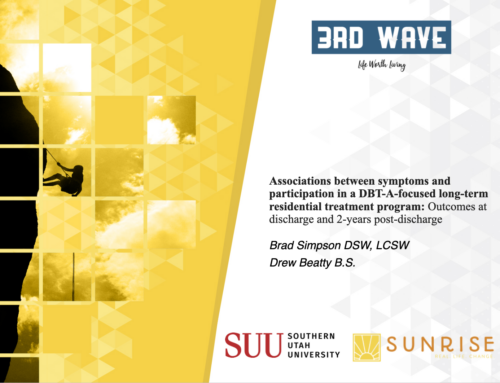Despite having the word behavior in its name, Dialectical Behavior Therapy (DBT) is indeed a relational therapeutic approach. In fact, establishing a trusting relationship between therapist and client is essential to a positive therapeutic outcome with DBT.
Dialectical Behavior Therapy is a talk therapy technique like psychotherapy. It uses elements of Cognitive Behavioral Therapy but focuses on people who experience intense emotion. Instead of just identifying unhelpful thought patterns and replacing them, DBT provides a set of skills to help regulate overwhelming emotions so people can gain control over their thoughts and feelings.
The relationship between the therapist and client is a key factor in gaining trust and learning DBT skills. Dr. Marsha Linehan, the founder of DBT, says therapy isn’t re-parenting, it’s a therapeutic relationship.
DBT therapists are asked to be genuine people with their clients. They often share personal experiences with their clients to give healthy examples of success and defeat. While in session, the DBT therapist meets the client where they’re at depending on personal needs. It’s as if the therapist is saying, “I know more about how to get from a to b, but we’re still equal people.”
For example, if the client is obviously exaggerating a scenario, the therapist may pretend to faint in exhaustion from such an elaborate story. This helps trigger the client’s focus on facts. Another example would be for a therapist to validate strong emotions so the client understands their emotions are real and warranted. DBT therapy is like a dance; feeling and validating emotion, remaining in facts, and continuing to breathe. It’s a dialectical balance.
It is also quite exhausting for both parties. Clients and therapists influence each other. Therapists are trained to be positive influences on very difficult clients. The process is emotionally draining for therapists which is why consultation groups are so important. DBT therapists are in consultation groups with their peers. It’s like therapy for therapists.
Yes, Dialectical Behavior Therapy is a relationship first, and behavior changes second.
Here’s a clip of Dr. Marsha Linehan speaking on the relational aspects of DBT:
As for our philosophy at Sunrise, Senior Clinical Director, Tifany Barlow states,
“Sunrise utilizes a relational-based approach to treatment. As a relational program, we focus on the relationship between the student, family members, mentors, and therapists. These relationships help to create an intrinsic motivation for change. The amazing thing about Sunrise is that we don’t use a relational approach alone, but we also approach things with a dialectical behavioral lens. This is so cool because we are able to improve our relationship with the student through appropriate behavioral interventions. With being dialectical, we don’t have to just choose one approach, but instead, we get to actually be effective and do what works.
We do this every day in little and big ways. An example that may highlight this would be when we have a student that is participating inappropriately in the group. We are able to ignore the inappropriate bids for connection and actually step in to connect and praise them when they are doing or saying anything that we would want to see in the group. This allows us to build our relationship and give them what they need in a way that will promote behavior to be more effective.
Another key part of our relational approach is that we are able to live and communicate our values in our relationships with the students. Instead of simply stating a rule that we want to follow, we coach and spend time with the student to discuss why that rule matters to us. For example, a conversation may come up when we are redirecting a student around gossip about a peer. We get a chance to discuss our value of respect and empathy as to why we don’t engage in gossip. These values aren’t just for the students to live by, but we also make sure that as mentors, teachers, and therapists that we are also living by the value of respect and empathy.
The best thing about Sunrise is that we don’t just tell our students to put down their walls to do the extremely hard work, but we model that vulnerability and connection with them. We practice talking to students about emotions within a professional environment. This includes a focus on validating the students for their emotional experiences to truly understand where they are coming from.”





